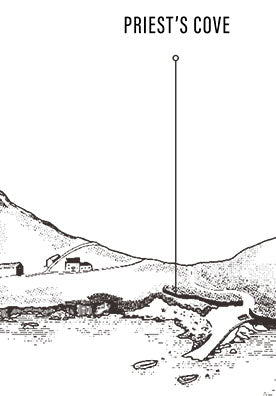Cornwall’s illustrious smuggling past is rich with tales of what the locals called “The Cornish Free Trade”. Between 1750 and 1830 there were massive import taxes implemented to fund foreign wars. Duties were levied on all sorts of goods essential to the Cornish fishing industry, from tea and pepper to muslins, handkerchiefs and even silk - brandy was subject 18 different duties totalling about a mammoth 250% . Historians note that even the tax on tea rose to 110%. Needless to say, the tax burden on the ordinary population was too enormous to bare and smuggling often meant survival, especially when some of these goods cost a sixth of the price to buy in France!Smuggling also meant secret hiding places, gangs (like the
Benbow Brandy Men) and contraband boats - some of which capsized at
Priest’s Cove. Wrecking was a part of the Cornish smuggling trade - any goods washed ashore from a wrecked ship were regarded as common property. The sight of a ship foundering would bring the nearby population to the beach, and before long, using pick-axes and hatchets the ship would be dismembered and any goods on it, carried away!
Often spirits and tobacco were found concealed in mines or in caves on the main beach linked by mysterious tunnels. Cornwall’s coast is filled with hidden coves - the ideal hiding place for contraband. The Tea Caverns in Newquay, for example, are named for china tea, a much prized commodity that would reap rich rewards for smugglers.
By the 1780s, smuggling turned into a much larger enterprise where those who could risk it, often turned to smuggling to seek their fortunes. More profitable than fishing, Cape Cornwall became a smuggler’s paradise, more so because there weren’t enough officials to monitor uninhabited coastline. Most of the local population had some involvement in the profession as it brought with it a better standard of living. These were lawless times.
One Cornish man, John Carter from Breage was perhaps the most famous smuggler. There were seven Carter brothers but John’s nickname was the “
King of Prussia”. He was the leader of the family smuggling business and owned two fast sailing craft with his brother Harry enabled a busy trade in wine, spirits and tobacco from across the channel in Brittany. They say a line of cannons protected his base near Land’s End.
While the romantic allure of smuggling has long vanished, evidence of this notorious trade in Cornwall is still everywhere. From the caves and tunnels on the beach to hidden passageways and secret vaults found in houses and pubs - it was even discovered that a Cornish farmhouse (known as
The Wink) on an estate had once been used to stash booze during the smuggling era when a cache of alcohol was found hidden in the fireplace! Today the spirit of smuggling is kept alive by the Cape Cornwall Rum company where the liquor is expertly blended in the same building, The Wink.







